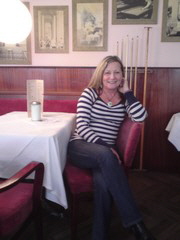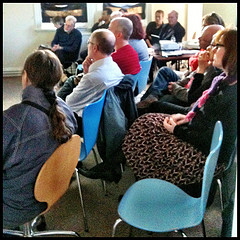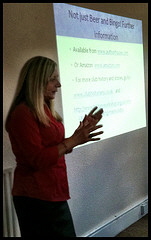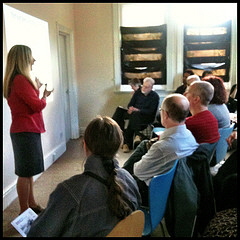Not Just Beer and Bingo!
Ruth’s book on clubs is now available!
In ‘Not Just Beer and Bingo! The Social History of Working Men’s Clubs’, Ruth traces the history  of clubs from their mid-19th origins and brings the story right up to date to 2012- the year that marks the 150th anniversary of the Club and Institute Union (CIU).
of clubs from their mid-19th origins and brings the story right up to date to 2012- the year that marks the 150th anniversary of the Club and Institute Union (CIU).
This is the first book that tells the complete club story across those 150 years.
All aspects of club life are covered in a highly readable, often funny, sometimes poignant manner. At all times, Ruth maintains a scholarly approach, drawing upon wide-ranging research and the wealth of information collected from scores of club goers, officials and entertainers from across the country. They tell their own stories throughout the book about the life and times of clubs, from nights out with the kids to seaside outings, games and gambling and club concerts.
Ruth highlights throughout the book how clubs were once at the centre of working class leisure time as well as at the heart of the communities where they were located. She shows how clubs played numerous social and cultural roles, making important contributions to the lives of their members and their families.
In this 150th anniversary year, with many challenges and club closures, Ruth details reasons for their decline but also in what ways club people are fighting back in order to bring in new members and keep their doors open. She finishes by offering valuable insights into their future prospects.
To find out more about the book and how to order, go to-
authorhouse
amazon
It is also available for Kindle and Android devices
--------------------------------------------------------------------------------
Not Just Beer and Bingo!
Now being stocked in London Bookshops!
You don't have to go online!
If you are interested in purchasing a copy of Ruth’s book, live in the London area, or are visiting London, it is now being stocked at the following bookshops:
Foyles, 113-116 Charing Cross Road, London. (History and Politics section)
Established in 1903 and probably the largest bookshops we have. Nearest tube- Tottenham Court Road or Leicester Square.
Housmans Bookshop, 5 Caledonian Road, N1.
Long established independent bookshop. Very near to Kings Cross/St.Pancras tube and overground stations.
The Big Green Bookshop, 1 Brampton Park Road, N22. (Just off the High Road)
A friendly, local independent bookshop serving the community. Nearest tube- Turnpike Lane or Wood Green.
--------------------------------------------------------------------------------
Not Just Beer and Bingo! A Social History of Working Men’s Clubs
CONTENTS LIST
Acknowledgements
Abbreviations
Time Line
Introduction
Setting the scene and introducing the main themes
Chapter One – Establishing the Early Clubs
Why were clubs needed? The Helping Hand of the CIU
What went on in Clubs? Convalescent Homes and Club Trips
To Drink or Not to Drink? ‘Private Members Only.’ Not so much ‘up North’ but ‘down South’. Political and Religious Affiliations
Chapter Two – Taking the Traditions into the 20th Century
No Landlords! Home from the Great War – Ex-Servicemen’s Clubs
Finding the Funds. The Interwar Years.
Post- War Club Building Boom. Modernisation is the Key Word!
Chapter Three – Bringing the Kids along: Clubs as Family Spaces
Children – ‘what club ever forgets these?’ Baby Boomers.
Getting ‘with it’! Losing their Appeal.
Not in front of the children?
Chapter Four – Taking their Turns: Entertainment
Uplifting or Degrading? Early Entertainment
Post War- Let the Good Times Roll. The ‘Ent Sec.’
A Training Ground for Talent . Not so funny- the current situation
Chapter Five – No Ladies Allowed? Women finding their Space for Pleasure
No Place for a Lady? Early clubs 1860-1930s. Opening the Doors Post War. Clubs as Safe Spaces.
The Struggle for Equality 1970s- 2007. Equal at Last?
Chapter Six – Games, Sports and Gambling
A Quiet Game or Two. The Post War Recreational Boom.
Eyes Down, Look In. Having a Flutter. Widening the Range of Activities. Who’s left playing now?
Chapter Seven – Working Women and Entertaining Ladies
They are all Working Women! Entertaining Females.
Sunday Lunchtime Strippers. Beauty Queens and Glamorous Grannies. What about the Cleaners? Final Note.
Chapter Eight – Dealing with Diversity
Charged with Discrimination: Historical Context.
‘You don’t have to be from the Valleys, but it helps. ’
Private Members and Invited Guests Only. Contemporary Situation.
Multicultural Entertainment?
Chapter Nine- Where have all the Members gone?
Ignoring the Writing on the Wall? Industrial Decline.
Social and Cultural Change. Committee and CIU Ways of Working. Legislation and Taxation.
The Smoking Ban and Cheap Supermarket Drink. And a few more things……
Chapter Ten – Survival, Revival and the Future
Doing it Themselves,
Communications and PR: the importance of the web.
CIU Actions., Any other ideas out there? Do clubs have a future?
--------------------------------------------------------------------------------
REVIEWS
Since publication of Not Just Beer and Bingo Ruth has given a number of presentations around the country with some attendant coverage on local radio. In addition to these events Club Historians has received some very pleasing reviews. Below we have listed several of these reviews beginning with a feature from the CIU Club Journal of October 2012.
--------------------------------------------------------------------------------
EVERY CLUB SECRETARY SHOULD BUY THIS BOOK:
and make money for their club
Anyone who enjoyed Dr Ruth Cherrington's short history of the CIU in Club Journal's 150th anniversary issue in June will enjoy the fuller version that she has turned into this book.
Ruth, a former lecturer at the University of Warwick, runs the Club Historians website and has become the country's leading expert on clubs; you don't need to read many pages to realise the enormous knowledge and research that has gone into this book — or to see the passion for the clubs held by the author as she progresses through the ages.
Her book charts the course of the CIU and its clubs from Henry Solly‘s initial visions through 150 years of the clubs’ world as they battled to establish themselves. It relives the magnificence of the 1960s, and 1970s when many of our TV talents learned their trade and the clubs hit boom time and then the sad decline as closures became commonplace. Ruth was born into clubland as her parents were all but married to the Canley Club in Coventry — but then as they lived opposite the club, that wasn't really surprising! She is full of interesting facts and figures about the clubs but in reality this book is a masterpiece of social history.
Ruth was born into clubland as her parents were all but married to the Canley Club in Coventry — but then as they lived opposite the club, that wasn't really surprising! She is full of interesting facts and figures about the clubs but in reality this book is a masterpiece of social history.
But don't take my word for it, no less a figure than former General Secretary Kevin Smyth has also described it as a very impressive piece of work.
The book is readily available at http://bookstore.authorhouse.com/ or from Club Union House (see below).
I would seriously suggest that all club secretaries purchase a copy and perhaps "rent it out|" to club members at £1 per time to read and and enjoy and support your club! After all, who knows what you might find out about your club?
Phil Johnson
Saffron Lane WMC, Leicester
If you would like a signed copy of Ruth's book, but don.t want to use the Internet, please send a note with your name and contact details to Ruth Cherrington, c/o The CIU, Club Union House, 253/254 Upper Street, London N1 1RY.
Enclose a cheque for £14.50 (cost of book plus postage and packaging) made payable to R.L. Cherrington and mark the envelope "BOOK OFFER".
--------------------------------------------------------------------------------
Book Review by long term club member
After reading your book I have to say how much I enjoyed reading it, it was well worth the wait. Both my wife and I have read it and in the early stage of the book, both of us would sit there with a laugh as we remembered certain times in the club.
You pointed out that "club life" was indeed special to both members and the community and also the good causes they raised millions for over the years.
One of the strange things about club life is, as you know, that even when you go to another club for the first time, meet other members for the first time, they are already your friends.
Your piece about the women's role in the clubs was spot on and over the years we have seen slow change.
It may be said that the clubs did not move with the times and that may be true but for the state we are in now I do believe that Government interference has had a major part in the clubs demise. There is no doubt that the smoking ban has had a devastating impact on not only clubs but also pubs, bingo and other social clubs.
After being a member of a working man's club and the CIU for about 44 years, 2007 changed all that. Our social life ended in 2007 and the only time I visit a club now is to renew our membership in the hope that Common sense will be shown in the near future.
This government must see that discrimination and intolerance is wrong and if they want to save businesses and jobs they must reform the present ban to allow all people choice. I do believe it is the only way to save what is left of our Clubs.
Some time ago I joined Age Concern and brought up the subject of loneliness in this country as a direct result of the smoking ban, something I think people in the country have little knowledge of but it is a valid point.
Once again, well done, the book is well worth the effort.
Tug Wilson
--------------------------------------------------------------------------------
A great write up on Ruth’s local community website
Beer, Bingo, Politics and Englebert Humperdinck:
Documenting 150 years of Working Men's Clubs
Posted by Liz on October 13, 2012 at 22:07 in Events / Activities / Things to Do
This month's talk at Stroud Green and Harringay library on Working Men's Clubs was another excellent one.
Ruth Cherrington, who at the moment is singlehandedly documenting the history of Working Men's Clubs across Britain on her site Club Historians and through her book, Not Just Beer and Bingo, treated a full house to a fascinating walk from the beginning of the club movement through its heyday in the 60s and 70s to the present day where many clubs are struggling to survive and some are being forced to close.
 |
Some of the audience at Stroud Green and Harringay Library
Ruth focused her talk on some of the many local clubs in this part of London, including Wood Green Social Club and the Langham Working Men's Club on Green Lanes. The Langham began life in a rented shop in Turnpike Lane in 1908, while Wood Green Social Club was forced to be 'dry' because they had a teetotal patron to help them set up in the building, a situation that lasted until 1949! Many local clubs were established by local transport workers, such as the Railwaymen in Finsbury Park.
 |
Ruth Cherrington
Ruth admitted that the decline of the clubs is a cause for concern and down to many factors, including the changing nature of leisure but was optimistic that some of the clubs can and will adapt, pointing to the success of Bethnal Green as an example of how clubs can change and thrive again.
 |
Not Just Beer and Bingo
Much, much more about this can be found at Ruth's website Club Historians where you'll also find links to buy her book, Not Just Beer and Bingo A Social History of Working Men's Clubs. Ruth has also written on History Workshop Online about this topic.
Many thanks to Ruth from the Friends of Stroud Green and Harringay Library for donating her time on a Saturday afternoon to deliver us a brilliant talk.
--------------------------------------------------------------------------------
Stuart Moore, Merseyside
I went out and bought the book, which I am half way through. My opinion? ..... it is fantastic! The factual history combined with the nostalgia makes superb reading.and is a worthwhile trip down memory lane for people like us who were brought up in a club environment. It is very sad when you look at the way these clubs operated and the facilities that they provided and then compare it to the way that they are slowly disappearing.’
Thanks for the positive feedback Stuart! .
--------------------------------------------------------------------------------
Camden Review
Entertaining the wheeltappers and shunters
by KEITH FLETT
RUTH Cherrington has written a fascinating book on Working Mens Clubs, part history, part analysis of where the Clubs have been since the late Victorian era and where they may be headed now.
For the many who have visited a club and perhaps still go to one, the book will be essential reading. But Cherrington also has a wider purpose of reviewing where the working class and its cultural and entertainment interests have been and are going. The Clubs after all were originally started to provide, what the reforming Victorian clergyman Henry Solly, called ‘rational recreation’.........
--------------------------------------------------------------------------------
